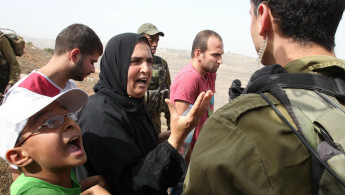Palestinians march against decades of severe Israeli restrictions
Palestinian residents and activists in the occupied West Bank city of Hebron have taken to the streets on Friday to hold demonstrations, marking more than two decades of severe and deeply discriminatory Israeli measures.
Following a surge in violence in the region since October 2015, the Israeli military has intensified its long-standing restrictions, declaring parts of Hebron's Old City a "closed military zone".
Troops have barred access to Palestinians living elsewhere in the city, as well as human rights defenders.
"For more than two decades, Israeli authorities have imposed severe and deeply discriminatory restrictions on Palestinian residents of Hebron's Old City," said Philip Luther, director of the Middle East and North Africa programme at Amnesty International.
"The new restrictions have compounded these violations and intensified the collective punishment of tens of thousands of Palestinians, in violation of international law," Luther added.
The right to freedom of movement
The Israeli military declared the Palestinian neighbourhood of Tel Rumeida near Hebron's Old City a "closed military zone" late October last year after violence in the region intensified.
At least 184 Palestinians have been killed by Israeli fire since October, 41 of them under the age of 18.
The unrest has especially affected young Palestinians, who have been on the front line of clashes with Israeli forces.
The administrative order prevents non-residents from accessing certain areas and is frequently used to repress Palestinian protests and demonstrations in the West Bank.
The terms of the closure mean that only people resident within the borders of the zone, and who agree to register with and receive a number from the Israeli army, can access the neighbourhood.
Those Palestinian residents are then subjected to arduous checks at multiple checkpoints, located at the entrances to the neighbourhood and various points within it.
But these restrictions are not applied to Israeli Jews living in the settlements, illegal under international law, in and around the city.
"By forbidding residents of Hebron from entering certain parts of the city purely because they are Palestinian, while Israeli settlers move freely and illegal settlements continue to expand, the Israeli authorities are flouting international law and perpetuating a cycle of human rights abuses," Luther said.
 |
By forbidding residents of Hebron from entering certain parts of the city purely because they are Palestinian, while Israeli settlers move freely and illegal settlements continue to expand, the Israeli authorities are flouting international law and perpetuating a cycle of human rights abuses |  |
Harassment of human rights defenders
Alongside the recent restrictions on movement in the centre of Hebron, human rights defenders - Palestinian, Israeli and international - have come under renewed pressure from Israeli forces and settlers.
Human rights defender Issa Amro is one of them.
The director of Youth Against Settlements, a Palestinian activist group committed to non-violence, was arrested and detained by Israeli troops in Hebron late last year.
His detention came after two Israelis were shot and wounded by a Palestinian gunman near the Ibrahimi Mosque, also known as the Cave of the Patriarchs, in November last year.
The Israeli army, accompanied by Israeli settlers, raided the organisation's centre and occupied it for 24 hours, during which the house was ransacked and equipment detroyed.
During his detention, he was kept blindfolded in the smelly bathroom of a police station for four and a half hours with his hands cuffed behind his back, while soldiers threatened to shoot him. Issa was released without charge later the same day.
Issa's arrest is just an example of the kind of harassment human rights defenders go through.
Activists who have played a crucial role for many years in documenting Israeli violations against Palestinians living in Hebron continue to be harassed and attacked by Israeli forces and settlers, Amnesty revealed.
In late October 2015, Israeli settlers put up posters of international activists and human rights defenders with the accompanying message "This is not a tourist, this is a hostile anarchist".
A number of individuals featured on the posters were pulled out of the city by their organisations, citing security concerns.
 |
International activists and human rights defenders, who have played a crucial role for many years in documenting Israeli violations against Palestinians living in Hebron, continue to be harassed and attacked by Israeli forces and settlers |  |
As the occupying power, Israel has particular obligations towards Palestinian civilians living under occupation, said Amnesty International.
"Arbitrary restrictions on movement, unnecessary use of lethal force, and the arrest, detention and harassment of human rights defenders are not legitimate security measures," Luther said.
The actions of Israeli forces in Hebron are consistently discriminatory, and have served to allow the settlers to continue to harass and attack Palestinians, the organisation added, calling on Israeli authorities to lift the discriminatory restrictions, end the collective punishment of Palestinians in the city and protect human rights defenders there.


![sudan women [getty] sudan women [getty]](/sites/default/files/styles/image_330x185/public/media/images/5019D7F4-52AF-4377-8A05-885D27476479.jpg?h=d1cb525d&itok=tKXV7r-W)